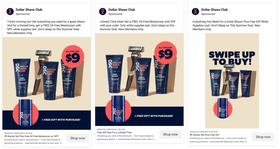Paid Social vs. Organic Social: Creating a Hybrid Strategy
Social media marketing has evolved quite a bit over the past few years. Let's go over paid social vs. organic social and why you need a hybrid strategy.
Read More
The social media landscape is full of opportunities for your brand — but you probably already know that. The real question is how to best leverage the various platforms, ad types, and tools to help your brand get ahead.
Luckily, we’re here to help with this checklist of four steps to take before launching your first ad campaign, whether it’s on Facebook, Instagram, Twitter, Pinterest, or TikTok. Let’s jump right in!
Brand guidelines are living documents that can help you — and your team! — create consistent content across your social media platforms.
When creating brand guidelines, try to answer these questions:
What’s our color palette?
What fonts should we use?
How should our logo be presented? Should it be used at all times or just occasionally? If so, what’s an example of when it might not be appropriate to include our logo?
Are we witty, friendly, bold, professional, or helpful?
What types of images should we use? Stock or original photos? Lifestyle or product shots?
Learn more about creating a brand guideline here!
Knowing who your target audience is, where they hang out online, and what type of content they engage with is one of the most important steps before launching your first social media ad. To get started, check out this step-by-step guide to building audience personas — going through this process is the ultimate way to ensure that each post you create is relevant and engaging. From there, you’ll be able to better leverage each platforms’ targeting tools when it comes to filtering your audience according to age, gender, geography, and other demographics. (After all, you don’t want to simply shout into the void and cross your fingers that someone will be there to receive it!)
You’ve probably already set up your profile pages on the platforms where you’re launching your ads, but are they optimized?
When considering what to include in your profiles, think about what information will help encourage shoppers to take an action. This means asking questions such as
Is it better to link to our homepage, a collection page, or a landing page?
Should we use the same cover photo across platforms or different ones to build a narrative?
How can we best adapt our logo for different platforms?
Are there hashtags we should include in our profile?
In marketing, you rarely need to reinvent the wheel. In fact, it’s often better to see what others are doing and apply their successes to find your own wins.
That said, take the time to conduct competitor research. Thanks to resources like Facebook’s Ad Library, it’s never been easier to see what other brands are doing and how they’re doing it. In particular, try to pay attention to these factors:
Their ad formats (e.g., video vs. carousel)
Their CTAs (e.g., “learn more” vs. “shop now”)
Their ad content (e.g., influencer-driven content vs. brand story content vs. product-led promotions)
Their image types (e.g., flat-lays vs. lifestyle shots)
You can also see how your competitors test different copy options while keeping the rest of the elements (e.g., CTA and image) the same.
Beyond these four to-dos, we’ve got one more pro tip: Use a social ads management platform. Rather than managing your ads across Facebook, Instagram, Pinterest, and TikTok — where you constantly shuffle between dashboards and attempt to piece together disparate data — an all-in-one platform like AdRoll can save you countless hours and, ultimately, money. Streamline your social ads, display ads, and email efforts with our automation builder.
Looking for more tips, tricks, and guides on paid (and organic) social media efforts? Check out the resources below!
Last updated on May 10th, 2023.
